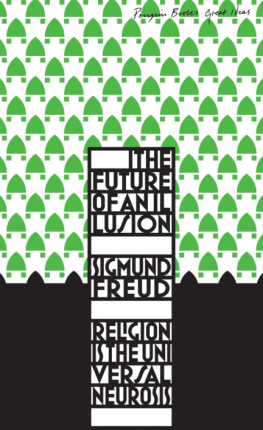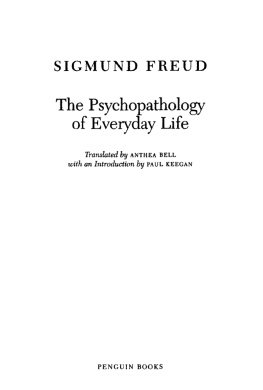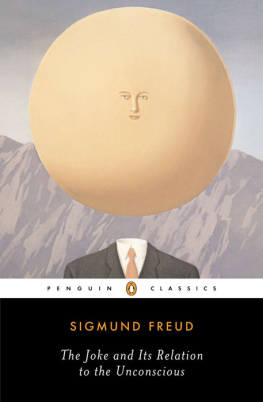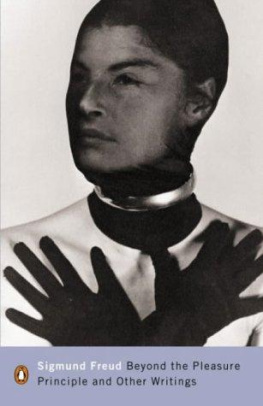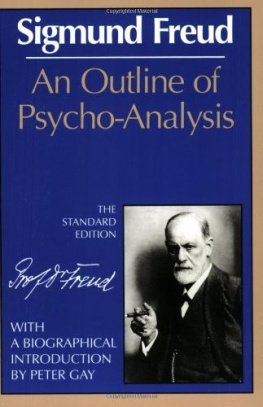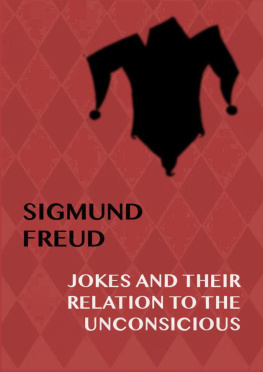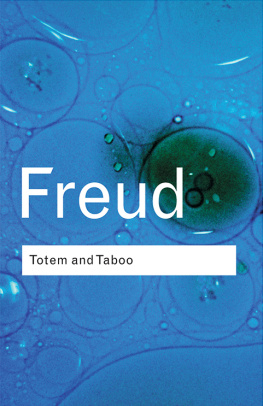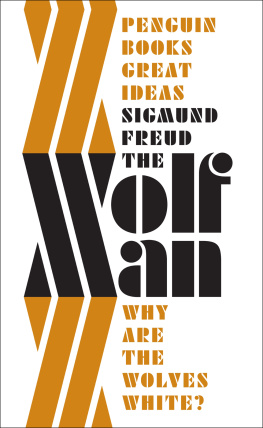Sigmund Freud 18561939
Sigmund Freud
The Future of an Illusion
TRANSLATED BY J . A . UNDERWOOD AND SHAUN WHITESIDE
PENGUIN BOOKS GREAT IDEAS
PENGUIN BOOKS
Published by the Penguin Group
Penguin Books Ltd, 80 Strand, London WC2R 0RL , England
Penguin Group (USA) Inc., 375 Hudson Street, New York, New York 10014, USA
Penguin Group (Canada), 90 Eglinton Avenue East, Suite 700, Toronto, Ontario, Canada M4P 2Y3 (a division of Pearson Penguin Canada Inc.)
Penguin Ireland, 25 St Stephens Green, Dublin 2, Ireland (a division of Penguin Books Ltd)
Penguin Group (Australia), 250 Camberwell Road, Camberwell, Victoria 3124, Australia (a division of Pearson Australia Group Pty Ltd)
Penguin Books India Pvt Ltd, 11 Community Centre, Panchsheel Park, New Delhi 110 017, India
Penguin Group (NZ), 67 Apollo Drive, Rosedale, North Shore 0632, New Zealand (a division of Pearson New Zealand Ltd)
Penguin Books (South Africa) (Pty) Ltd, 24 Sturdee Avenue, Rosebank, Johannesburg 2196, South Africa
Penguin Books Ltd, Registered Offices: 80 Strand, London WC2R 0RL , England
www.penguin.com
The Future of an Illusion taken from Mass Psychology and Other Writings
This translation first published in Penguin Classics 2004
Translation J. A. Underwood, 2004
Mourning and Melancholia taken from On Murder, Mourning and Melancholia
This translation first published in Penguin Classics 2005
Translation Shaun Whiteside, 2005
Sigmund Freuds German texts collected in Gesammelte Werke (194052) Imago
Publishing Co. Ltd, London, 1940, 1946, 1950
This edition first published 2008
All rights reserved
The moral right of the translators has been asserted
Except in the United States of America, this book is sold subject to the condition that it shall not, by way of trade or otherwise, be lent, re-sold, hired out, or otherwise circulated without the publishers prior consent in any form of binding or cover other than that in which it is published and without a similar condition including this condition being imposed on the subsequent purchaser
ISBN: 978-0-141-96332-7
The Future of an Illusion
I
Having lived for quite some time within a specific culture and tried repeatedly to study the nature of its origins and the path of its development, one also feels tempted just occasionally to turn and look in the other direction and ask what fate has in store for that culture and what changes it is destined to undergo. One quickly becomes aware, however, that any such venture is invalidated from the outset by several factors, chief among which is that only a few individuals are capable of commanding an overview of human activity in all its ramifications. Most people have found it necessary to concentrate on one or a small number of fields; yet the less a person knows about past and present, the shakier that persons judgement will inevitably be with regard to the future. Another factor is that, in this judgement in particular, the subjective expectations of the individual play a role that is hard to assess; yet those expectations turn out to depend on purely personal elements in an individuals own experience, his or her more or less hopeful attitude to life, as dictated by temperament and by degree of success or lack of it. Lastly, there is the effect of the remarkable fact that people in general experience their present almost naively, unable to appreciate what it holds; they must first put some distance between it and them in other words, the present must first have become the past before it will furnish clues for assessing what is to come.
So anyone yielding to the temptation to pronounce on the probable future of our culture will do well to bear in mind the reservations outlined above likewise the uncertainty that, as a general rule, attaches to any prediction. The consequence for me is that, in my haste to flee this excessive task, I shall swiftly resort to the smaller, more restricted area on which my attention has been focused hitherto, having first determined where that area lies in relation to the larger picture.
We know that human culture, by which I mean everything in which human life has risen above its animal circumstances and in which it distinguishes itself from animal life (and I refuse to separate culture and civilization), shows the observer two sides. It includes on the one hand all the knowledge and skill that humanity has acquired in order to control the forces of nature and obtain from it goods to satisfy human needs, and on the other hand all the institutions that are required to govern the relations of human beings one to another and in particular the distribution of such goods as can be obtained. The two directions of culture are not independent of each other, firstly because the mutual relations of human beings are extensively influenced by the amount of drive-satisfaction made possible by the commodities available, secondly because the individual human being can himself, vis--vis another person, assume the relationship of a commodity in so far as that other person makes use of the said individuals labour or takes the individual as sexual object, but thirdly because every individual is, in virtual terms, an enemy of culture, which is in fact supposed to constitute a universal human interest. It is a curious fact that human beings, incapable of living in individual isolation, nevertheless find the sacrifices that culture asks of them in order to make human co-existence possible a heavy load to bear. Culture, in other words, needs to be defended against the individual, and its arrangements, institutions and decrees all serve that end. Their purpose is not only to put in place a certain distribution of goods but also to maintain it; there is a need, in fact, for them to protect against the hostile impulses of humanity everything that serves to tame nature and generate commodities. Human creations are easily destroyed, and science and technology, having built them up, can also be used to tear them down.
This gives the impression that culture is something imposed on a reluctant majority by a minority that has managed to gain possession of the instruments of power and coercion. The natural assumption is of course that these difficulties are not of the essence of culture itself but spring from the imperfections of the forms of culture developed hitherto. Indeed, it is not hard to demonstrate such shortcomings. Whereas humanity has made continuous advances in controlling nature and can expect to make even greater ones, similar progress in the government of human affairs cannot be ascertained with any certainty, and it has doubtless always been the case (as it is again today) that many people wonder whether this bit of their cultural inheritance is in fact worth defending. One would think that some rearrangement of human relationships must be possible such as would cause the sources of dissatisfaction with culture to dry up by renouncing coercion and the suppression of drives and allowing people to devote themselves to acquiring and enjoying commodities undisturbed by inner discord. That would be the Golden Age, except that one wonders whether such a condition can ever be realized. It seems instead that every culture must be based on coercion and drive renunciation; it does not even appear certain that, with coercion removed, the majority of human beings will be prepared to take upon themselves the labour that must be performed if greater quantities of essential commodities are to be obtained. We need in my view to accept that destructive (i.e. anti-social and anti-cultural) tendencies are present in all human beings and that in a large proportion of people such tendencies are powerful enough to dictate their behaviour within human society.

